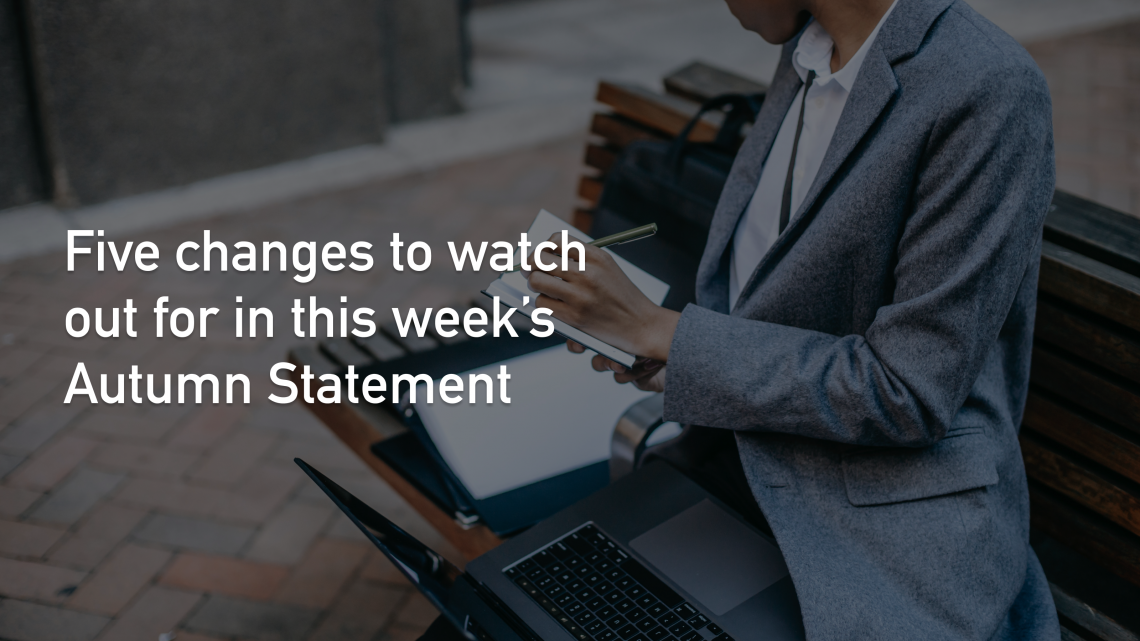
As the UK’s Chancellor of the Exchequer prepares to announce tax cuts in his Autumn Statement this week, our tax experts outline five changes to watch out for.
1. Make full expensing permanent to supercharge UK businesses
“Earlier this year the Chancellor ignored pleas to scrap the government’s planned increase to Corporation Tax rates. As a result, many businesses felt the pinch as the rate sprung from 19% to 25%. To ease the pain, the government introduced full expensing instead, where businesses can claim back the full costs of investments on IT equipment and machinery in their tax returns over the next three years.
“The Chancellor may argue that the UK still has the lowest Corporation Tax rate in the G7. The reality is that more is needed to supercharge UK businesses and bring back the nation’s entrepreneurial spirit. We agree with the industry’s calls for full expensing to be made permanent, and we’d welcome more imagination from the government to bring new ideas that will help to make the UK the poster child for an environment where entrepreneurs and businesses can thrive.”
2. Increase the Inheritance Tax nil rate band in line with inflation
“Inheritance Tax is an unpopular tax in Britain and so a reduction to the rate would be widely welcomed. However, we must not forget that if the Chancellor was to unfreeze the cap on the nil rate band, many people could avoid paying the tax altogether.
“As it stands, the nil rate band, which is the amount you can pass onto your loved ones without paying any Inheritance Tax, is £325,000. The decision by the government to freeze this figure until 2028, rather than increase it in line with inflation, means that many people have found themselves caught in the Inheritance Tax trap for the first time.
“As always, the devil will be in the detail. For example, one of the only advantages of Inheritance Tax is the tax free uplift on death for Capital Gains Tax, and so we should keep a close eye on whether or not this is tampered with.”
3. Identify a longer term solution for the UK’s property market
“Cuts to Stamp Duty Land Tax will likely result in higher volumes of property sales but the Chancellor must consider the knock on effects. For example, the introduction of a ‘downsizing relief’ may drive more “empty nesters” to sell up and increase the number of larger properties coming onto the market – but these downsizers still need to live somewhere. This could drive competition over properties that are classic first time buyer territory, pushing up the prices for a demographic that the government should be supporting.
“Remember that the average house price in England stands at about £310,000. Of this amount, only £60,000 is subject to SDLT, adding £3,000 to the purchase price of the average property, with first time buyers already protected from SDLT until they are paying over £425,000. Instead the Chancellor could take a fresh look at the supply side of the equation.
“Currently large property developers are subject to a 4% increase in their tax rate on annual profits over £25m. By reducing the tax burden on builders who complete developments quickly, using information like property purchase dates, planning consents or both, could build the foundations for a longer term solution for the UK property market.”
4. Continue the freeze on Fuel Duty, or risk fuelling inflation instead
“Let’s hope that the thirteenth year of Fuel Duty freezes isn’t an unlucky one. Many forget that VAT is added on at the pump, so if the Chancellor decides to reverse the 5p fuel duty cut this week, customers will see a 4% increase – around 6p per litre – to the price of fuel. Not only would this alienate motorists up and down the UK, it would be at complete odds with the government’s mission to keep inflation under control.”
5. Give the UK some much-needed retail therapy
“With British retail sales hitting a two year low, the Chancellor can no longer ignore the challenges facing UK retailers. The post-Brexit scrapping of VAT-free shopping for visitors outside the European Union in 2021 has led to potential customers choosing to do their shopping in other European countries, such as France, where the rules are more attractive and they can get more bang for their buck.
“We’ll have to wait and see what the government has in store for UK retailers in this week’s Autumn Statement, but bringing back VAT-free shopping would be a quick way to put the UK back on the map as one of the world’s go-to shopping destinations.”
Make sure you are following HW Fisher’s social channels for live reactions to the Chancellor’s Autumn Statement this week. Find our X/Twitter channel here and our LinkedIn page here.
We’d love to hear from you. To book an appointment or to find out more about our services: